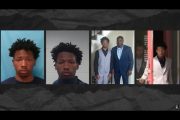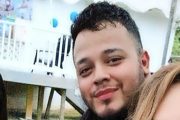
When Martha MacCallum got word that members of the New Black Panther Party had arrived in Ferguson, Missouri, she went to their Facebook page and was astonished at what she found: “The FBI is very concerned about this and when I went on their Facebook page today of the leader of the group, Chawn Kweli, it was astonishing to me the things that he is saying.” She then read excerpts from it:
August 10 [the day after the shooting]:
There are committed trained warriors on the ground in St. Louis.… There are also spies and deflectors on the ground too.… All general orders are in full effect across the nation.… That military stockpile got flashed today.… No tears, no fear — only ambition and determination.
Fox News staffers uncovered more from Kweli’s Facebook page: “This is the hour all the greats promised. If you die, die like a warrior. I’ll see you on the ground.”
On Wednesday the group made a list of demands, along with other groups including the Nation of Islam and the Organization for Black Struggle. Part of the list mandates that the officer involved in the shooting of Michael Brown on Saturday be fired and charged with murder.
On Friday morning the New Black Panthers made their presence felt by taking over a press conference scheduled for Ferguson’s Police Chief Tom Jackson. The group’s leader, Hashim Nzinga, grabbed the mic and ranted to the audience gathered there, criticizing President Obama, calling him a “Mau Mau” from Kenya, adding, “He need to go back to his roots and stop people from killing Africans in the streets.”
The Panthers is the same group that tried to stir up trouble in Sanford, Florida, following the shooting of Trayvon Martin by George Zimmerman back in 2012 when it announced a bounty of $10,000 for the capture of Zimmerman — “dead or alive” — resulting in Zimmerman going into hiding. When asked at the time why the party was deliberately inciting violence there, then-leader Mikhail Muhammad answered: “An eye for an eye, a tooth for a tooth.”
The group, first formed in 1989, has a long history of racial confrontations and incitements to riot. Most recently, in 2008, during the presidential election, poll watchers in Philadelphia found two New Black Panther militia members blocking the entrance to a polling booth and shouting racial epithets to those entering to vote. In January, 2009, the U.S. Justice Department filed suit against the group and three of its members for violating the Voting Rights Act of 1965, but the group was eventually exonerated as no proof could be found that any voters were actually intimidated sufficiently not to vote.
The New Black Panther Party, whether its members know it or not, is fulfilling another vital purpose in the long war against local police departments. As Jan Kozak wrote in And Not a Shot is Fired (originally published in 1962 and republished by Robert Welch University Press in 1999), the real purpose of groups such as the NBPP is to stir up trouble “below” in order to create pressure from “above” to expand the power and reach of government in response to the “crisis.” Kozak described these groups as
Grassroots revolutionaries [who] whip up the appearance of popular support for their revolutionary agenda through strikes, rallies, petitions, threats, and — sometimes — sabotage.
The “pressure from below” by the small number of revolutionaries and their larger number of dupes is then used to justify the centralization of power in the hands of the … state….
Each legislative victory results in new demands for even stronger legislation … [by claiming] that they are acting in the name of the popular will. The cycle continues until … the revolution is a fait accompli.
The agenda for years has been the neutralization and emasculation of local police forces answerable only to local citizens and their replacement by a national or federal police force. This is the real agenda for which the New Black Panther Party dupes and useful idiots are laboring. With the assistance from above — pressure from the FBI, the Justice Department, and the White House, which have just entered the fray in Ferguson — it remains to be seen whether that agenda can succeed there. If it does, then it will serve as a template for the next time another “opportunity” arises elsewhere in the country when a local police officer is involved in a shooting like this one.
It also explains why members of The John Birch Society have labored long and hard to “support your local police and keep them independent” starting in the mid-1960s and continuing to the present.
A graduate of Cornell University and a former investment advisor, Bob is a regular contributor to The New American magazine and blogs frequently at www.LightFromTheRight.com, primarily on economics and politics. He can be reached at [email protected].




